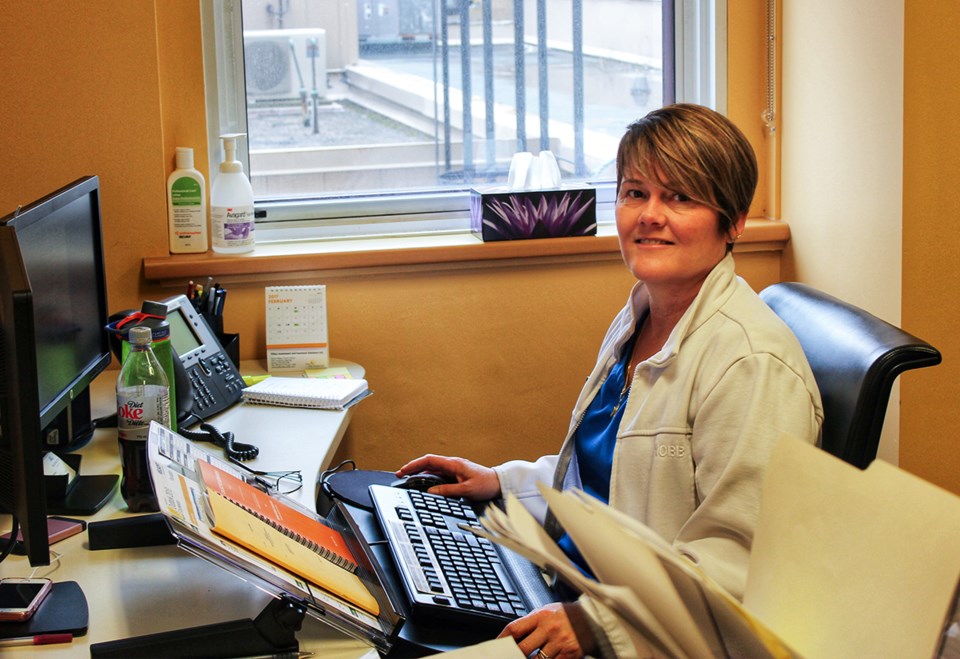Cathy Dobson
Registered Nurse Liz Anthony is a 32-year veteran at Bluewater Health. Currently she’s a charge nurse on the 24-bed Medical/Telemetry unit, which cares for cardiac and stroke patients but also treating COVID-19 patients too ill for a medical ward but not sick enough for Intensive Care. This interview has been condensed.
JOURNAL – First of all, please know how much you and all the front-line workers at Bluewater Health are appreciated. Our community thanks you for all you do.
L.A. – Thank you so much.
JOURNAL – Describe what it’s like to work with COVID-19 patients.
L.A. – The nursing care is the same but it’s about the unknown. We’re starting to be able to recognize COVID-19 but initially we weren’t sure how it was going to present. We’ve got a wide range of patients on our unit and COVID-19 is showing us they can deteriorate quickly. We aren’t sure what path the disease takes and that keeps staff very much on their toes. At any time, the coin could flip and the patient will deteriorate.
JOURNAL – We’ve heard a lot about the health-care system becoming overwhelmed if we don’t ‘flatten the curve.’ Has that happened on your unit?
L.A. – We were very overwhelmed in the beginning. Everything was new and our staff wasn’t sure what PPE (Personal Protective Equipment) was required or what to expect. It was very nerve-wracking for everyone. We also didn’t know if we would bring (COVID-19) home, but as time has gone on our staff has become more confident and I think we’ve done very well. We are now more prepared … because we know what to expect.
JOURNAL – What are the unique challenges caring for a COVID-19 patient?
L.A. – It’s very difficult for the patients, especially because they can have no visitors. Staff is their support and they spend a lot of time with them. The nicest thing we’ve utilized are iPads so they can speak with family. The physicians, too, are taking time to call the families and update them and I know the families are thankful to talk to the physicians. Our social work team is also a huge part of this. I just love my unit. We have an extraordinary team on Med-T.
JOURNAL – Do they have enough PPE?
L.A. – So far, we have been OK with this. We were quite concerned because of the shortage all over the world but if we haven’t had enough PPE on the unit, we call and get security to bring it for us and that hasn’t been a problem. Our biggest concern is knowing when we should use the N-95 masks. We use N-95 masks if intubating or suctioning someone. But most of the time, we’re using a surgical mask, a face shield, a gown and gloves for COVID-19. I think there is some staff concerned about using surgical masks but, myself, I feel safe and confident with (the protocols).
JOURNAL – Is there still a danger of the system being overwhelmed?
L.A. – The community has obeyed or followed the rules. We were expecting the worst and I think we’ve done very well. But I also think if we start reopening and there’s more socializing, there’s always a possibility the system could be overwhelmed.
JOURNAL – We’re told we’re only at the beginning of this pandemic. How are you preparing for the months ahead?
L.A. – It’s been a long stretch already. We are a very active unit. It’s difficult personally because I miss my (grown children living on their own) and we can’t visit. But I choose to continue to live at home with my husband because we both work at the hospital. He’s a retired respiratory therapist who came back to help. So we’re both in the same boat. When we work, we bring a second set of clothes and launder them as soon as we’re home, as well as shower. We go for walks and we’re being conscientious about staying healthy.
JOURNAL – Have any of the community acts of kindness impacted you at work?
L.A. – An awful lot. Lunches are often provided and treats are dropped off regularly. It’s been lovely. But I think the most special was the parade of first responders, the police, the fire, that drove by and gave their support for hospital workers. We’ve also seen community support when our patients are discharged. We don’t always know that our patients leave the hospital after they are transferred from our unit, but we saw Alex (Kapteyn, 81) greeted by so many people as he left the hospital, and that was very nice. He was on our unit from Day 1 until he had to go to the ICU and it was great to see he got to go home.
JOURNAL – What can the community do to help our front-line hospital workers?
L.A. – Follow the rules. I just want everyone to help one another and support each other, especially the elderly. And let’s see how this goes.
